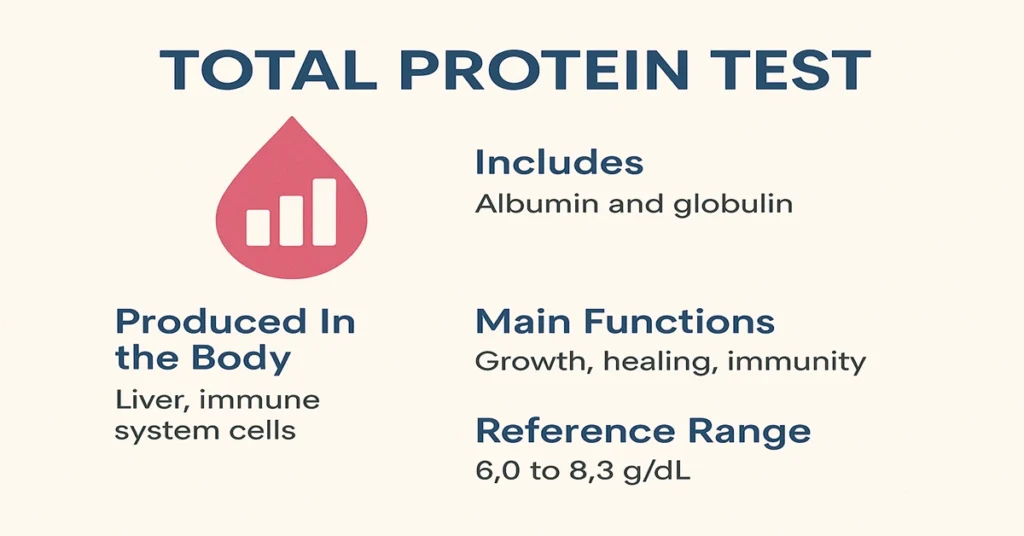Introduction
Proteins are one of the most essential components of the human body. They are often called the “building blocks of life” because they are involved in almost every body process, from growth and repair to immunity and energy balance. To measure the overall protein status of the body, doctors often recommend a Total Protein Test.
This blood test measures the combined amount of all proteins in your blood, mainly focusing on two key protein groups – Albumin and Globulins. Monitoring these levels can provide important information about your liver, kidneys, immune system, and nutritional status.
What is Total Protein?
The Total Protein test measures the sum of all proteins in the bloodstream. The two most important types are:
- Albumin – The most abundant protein in the blood.
- Globulins – A group of different proteins that perform various protective and supportive functions.
Proteins circulate in the blood and play a vital role in growth, healing, immunity, and overall body functions. Any imbalance in their levels may indicate an underlying health condition.
Where is it Produced in the Body?
Different proteins are produced in different organs:
- Albumin is made in the liver. It reflects how well the liver is functioning.
- Globulins are produced in both the liver and by immune system cells such as plasma cells and lymphocytes.
These proteins are continuously produced and maintained to keep the body in balance.
Functions and Importance of Total Protein
Proteins are not only structural components but also functional regulators. Some of their major roles include:
- Maintaining fluid balance within blood vessels, preventing swelling.
- Transporting nutrients, hormones, and waste products throughout the body.
- Supporting the immune system by producing antibodies (globulins) to fight infections.
- Helping with blood clotting, tissue healing, and muscle function.
- Providing building blocks for cells, tissues, and enzymes.
Thus, measuring total protein helps in evaluating:
- Liver and kidney health
- Nutritional status
- Chronic inflammation or infections
- Certain cancers, such as multiple myeloma
Causes of Low Total Protein (Hypoproteinemia)
A low protein level can occur due to reduced production, increased loss, or poor absorption. Common causes include:
- Liver disease – Reduced albumin production.
- Kidney disease – Loss of proteins in urine.
- Malnutrition or poor diet – Low protein intake.
- Digestive disorders such as celiac disease or Crohn’s disease, which affect nutrient absorption.
- Severe burns or major blood loss, leading to protein loss.
- Heart failure or prolonged illness, which disturbs protein balance.
Symptoms of Low Protein Levels
When protein levels drop below normal, the body shows several warning signs, such as:
- Swelling (edema), especially in legs or face.
- Fatigue or weakness, due to lack of nutrients.
- Unexplained weight loss.
- Hair thinning or hair loss.
- Frequent infections, as the immune system weakens.
- Slow wound healing, because the body cannot repair tissues properly.
Causes of High Total Protein (Hyperproteinemia)
Excess protein in the blood may not always mean increased production. Sometimes, dehydration makes protein levels appear high. Other causes include:
- Dehydration – Less water in the blood increases protein concentration.
- Chronic inflammation or infections.
- Multiple myeloma and other blood cancers, which produce abnormal proteins.
- Autoimmune diseases like lupus or rheumatoid arthritis.
- Chronic viral infections such as HIV or hepatitis.
Symptoms of High Protein Levels
Symptoms depend on the underlying cause. Some possible signs include:
- Bone pain (commonly seen in multiple myeloma).
- Frequent infections, due to abnormal immune function.
- Fatigue or weakness.
- Unexplained weight loss.
- Thick or sticky blood (in severe cases, leading to circulation issues).
Reference Range (Normal Values)
The normal range for Total Protein in blood is:
- 6.0 to 8.3 g/dL
(This range may vary slightly depending on the laboratory.)
Sample Type and Collection
To perform this test, a blood sample is collected.
- Sample Type: Serum
- Tube Used: Red Top (Plain Tube)
The process is simple and quick, usually requiring no special preparation unless the doctor advises fasting.
Test Preparation
In most cases, the Total Protein test does not require fasting. However, your doctor may recommend avoiding certain medicines or having the test done in combination with other blood tests (like liver or kidney function tests). Always follow your doctor’s instructions for accurate results.
When to Consult a Doctor
You should consult a doctor if you notice any of the following:
- Persistent swelling in your legs, face, or abdomen.
- Constant fatigue or unexplained weakness.
- Frequent infections or slow-healing wounds.
- Sudden weight loss without trying.
- Symptoms of dehydration or chronic illness.
Early testing and medical advice can help diagnose and treat the underlying cause effectively.
Important Word Explanations
- Albumin – The main blood protein made by the liver, helps in fluid balance and transport.
- Globulins – A group of proteins, including antibodies, that support immunity and other functions.
- Hypoproteinemia – A medical term for low protein levels in the blood.
- Hyperproteinemia – A condition where blood protein levels are higher than normal.
- Multiple Myeloma – A type of blood cancer affecting plasma cells, leading to abnormal protein production.
- Edema – Swelling caused by fluid buildup in tissues.
~END~

